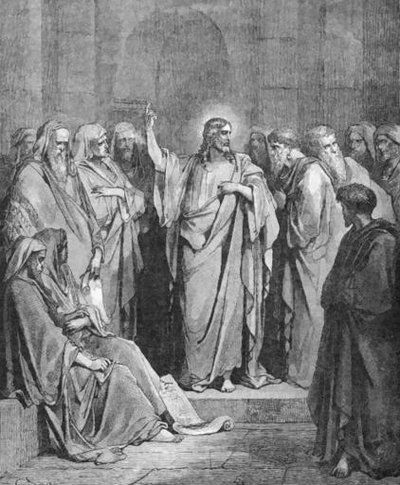Thoughts for the Day
Friday, 29th July 2022: Social reformers
Helping others Jesus Luke 4 Love one another
Reading : Verses from Luke, Chapter 4

When he came to Nazareth, where he had been brought up, he went to the synagogue on the sabbath day, as was his custom. He stood up to read, and the scroll of the prophet Isaiah was given to him. He unrolled the scroll and found the place where it was written:
‘The Spirit of the Lord is upon me,
because he has anointed me
to bring good news to the poor.
He has sent me to proclaim release to the captives
and recovery of sight to the blind,
to let the oppressed go free,
to proclaim the year of the Lord’s favour.’
And he rolled up the scroll, gave it back to the attendant, and sat down. The eyes of all in the synagogue were fixed on him. Then he began to say to them, ‘Today this scripture has been fulfilled in your hearing.’
(Church in Wales Lectionary, New Revised Standard Version)
Thoughts
Our reading today shows us Jesus in the Synagogue in Capernaum, where he is given the scroll of Isaiah, and states that he is the one who has come to bring good news to those in need. So today we look at two social reformers who made a great difference to others.
William Wilberforce: Born in 1759 in Yorkshire, England he was a British politician and philanthropist who fought to abolish the slave trade. He was an evangelical Christian. His spiritual adviser was John Newton a former slave trader, and he was a friend of William Pitt the Prime Minister. Wilberforce was indefatigable in parliament and elsewhere, giving eloquent speeches against the slave trade. In 1807, he finally achieved part of what he wanted - a bill to abolish the slave trade in the British West Indies which was carried in the Commons 283 to 16. However, this statute did not affect those enslaved before the Act, and when Wilberforce retired from Parliament in 1825 things had not changed. But on July 26, 1833, the Slavery Abolition Act was passed by the Commons and became law the following month. Three days later William Wilberforce died, and was buried in Westminster Abbey.
Josephine Butler: Born in 1828 in Northumberland, England, her father was a social reformer, campaigning against the slave trade. She married George Butler and had four children, but in 1863 her six year old daughter died. From this time she began to involve herself in charity work, particularly the rights of women. She campaigned against child prostitution, to raise the age of consent from 13 to 16 years of age. She then moved on to campaign to change the Contagious Diseases Acts, which could force women to be arrested and physically examined. She toured the country and helped repeal the acts. Josephine was heavily involved with the education of women, pushing Cambridge University into providing further education courses for women which led to the foundation of Newnham, an all-women college. She died in 1906.
Perhaps today we can do something to help someone in need: offer food to a local food bank; give some items to a charity shop; and/or pray for those who need help.
Prayer
Lord Jesus Christ,
as we read about William Wilberforce
and Josephine Butler this day,
may their example
give us the impetus to help others now.
Amen.
You might like to look up this site to find out ways to help others: